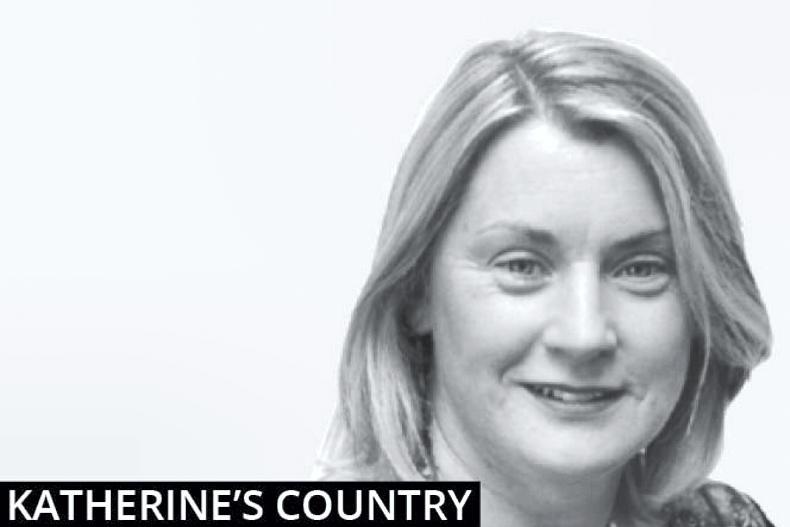It is lovely to have a wide and varied life. Last Friday, I was in school with a Halloween hat on my head. The previous day I was all dressed-up for the Women and Agriculture Conference.
The pupils are either all excited about Halloween or terrified. That pretty much mirrors how all our lives are; composed of days that are wonderful and days that are extremely challenging. It’s how we meet these challenges that define us.
An event like the Women and Agriculture Conference serves to motivate and encourage us to take stock of all aspects of our lives. We also have the added bonus of drawing strength and determination from others who inspire us.
I am spurred on by the women who take me by the hand and say words to the effect of: “Listen, this is what I’m dealing with at home. This is my situation. Now what do you think of that?” Oftentimes there are no words to be spoken. I respond with a hug. People take the opportunity to tell me their troubles and I really appreciate that because it keeps me grounded and informed. To be honest, I was gobsmacked several times last Thursday.
Women often become carers suddenly and unexpectedly. It takes time to get your head around new situations. Of course, that challenge is not exclusive to women but it was women’s stories that I was hearing at the conference. We had over 750 women in the one spot. Quite a few were attending for the first time, which is lovely. There were also several who had been to all 10 of the conferences.
BUSINESS THROUGH ADVERSITY
It was my privilege to facilitate three amazing women to tell their stories of “building a business through adversity”. It turned into rebuilding businesses after life-changing situations.
All three women had sound businesses before an event in their lives knocked them off the rails. Mary and John Breen were dairy farmers from Co Limerick. They were among the first farmers to go public after their dairy herd was depopulated in 1996 when a sick cow was diagnosed with BSE.
Siobhan and Paul Lawless made the decision to get out of cows and set up Foods of Athenry. They built another bakery to expand into the gluten-free market in 2011. However, a fire burnt the lot to the ground before the new machinery was even unwrapped.
On New Year’s Eve in 2012, Sallyanne and Derry Clarke’s lives were numbed when their son Andrew died by suicide. They were heartbroken. The couple ran a thriving restaurant business, l’Ecrivain, in Dublin. People reacted by cancelling their parties and so the business was struggling too.
WHAT DID WE LEARN?
People in difficulty often experience feelings of guilt. This can be of their own making and even irrational. Still, it is an emotion that paralyses creativity and healing. Siobhan didn’t know what started the fire, yet she felt that she was somehow to blame. She should have guarded against it. She also learned that a fire extinguisher only lasts about 30 seconds!
Mary spoke to me at length about shame. Her way of dealing with this was to return to the mode of what she dubbed “the ordinary farmer’s wife”, where she shunned the outside world.
She stopped participating in community affairs and her other interests. Her feelings of shame stemmed from the fact that they themselves had fed the cow the contaminated meat and bone meal when it was a calf. Even though Mary and her husband John had no way of knowing this, she still felt deeply ashamed.
The most difficult thing for Sallyanne was the way people avoided her and Derry. They did not know what to say so they stayed away. This was a double-edged sword because their business depended on people coming into the restaurant. They had to go to the media to appeal for people to support them.
In conversation with these women, clear messages emerged. The first is the need to talk, to tell the story, to express feelings in trying to understand the new situation. When a tragedy or misfortune strikes people we know, we should always acknowledge it. Yes, we might not know what to say but that is no excuse to avoid talking or visiting someone. Your presence will mean the world.
Start the conversation with: “I don’t know what to say to you but is there anything I can do to support you?” It will make a difference to someone going through a difficult time. The last thing I would want to do is to make people feel shame or guilt, alone or isolated. That’s what we do when we stay away.
Despite huge challenges, these three women got on with their lives and rebuilt their businesses. More than that, they renewed their outside involvements, giving back to the communities that had supported them.
AN IMPORTANT MESSAGE
Dr Maureen Gaffney in her address said that we have a huge capacity to adapt to almost anything. She said: “The ability to turn our lives around is one of the extraordinary things about human nature.
“People find something within themselves and turn it into something they never had before. If we could hold on to that message, we would have no fear in life.”
She encouraged us to remember that when the big challenges come, most people survive, adapt and recover.
There was much to be learned and absorbed at the conference. A number of speakers addressed the succession question. I will return to that. If we could maintain the enthusiasm, resilience and determination we came away with last Thursday for our lives and our businesses, we would achieve great things. CL






SHARING OPTIONS